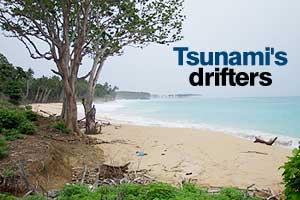
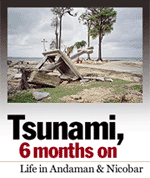 The road to the Brichgunj camp winds up a picturesque hill that overlooks the Port Blair airport runway. Shamsher, the Punjabi driver of our Maruti car, had said the ride wasn't going to be smooth, and the dark monsoon clouds lurking above heralded further hindrance. To add to it, there was no umbrella on board.
The road to the Brichgunj camp winds up a picturesque hill that overlooks the Port Blair airport runway. Shamsher, the Punjabi driver of our Maruti car, had said the ride wasn't going to be smooth, and the dark monsoon clouds lurking above heralded further hindrance. To add to it, there was no umbrella on board.
Brichgunj houses intermediate shelters for those who lost their homes in the tsunami around Port Blair. It is one of the best looking temporary shelters one can find in Andaman and Nicobar or in Tamil Nadu -- the other Indian state that suffered extensive devastation after killer waves took over 11,000 lives in the country on December 26.
The homes in Brichgunj had electric supply and looked far neater, unlike the shelters in the island of Hut Bay, nine hours by ship, south of Port Blair, where electrical connections had been installed but there was no power supply yet.
In contrast in Brichgunj, Gregory Bodra's two children were sleeping under a whirring fan as the rain lashed his tin shelter. Residents revealed that hectic cleaning was done at the camp the previous day and power was restored just in time for the visit by a delegation of parliamentarians from New Delhi.
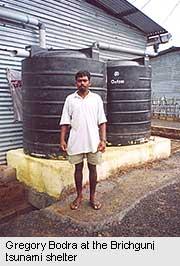 Yet, Gregory Bodra was despondent. Apart from the technical glitch -- if you switched on the fan, the bulb went off and vice versa -- he had far too much to worry about.
Yet, Gregory Bodra was despondent. Apart from the technical glitch -- if you switched on the fan, the bulb went off and vice versa -- he had far too much to worry about.
"I don't have a job and all I was given as compensation was Rs 2,000 immediately after the tsunami. I didn't get the Rs 13,000 the others got," said Gregory, 26, a labourer-cum-shop assistant from Katchal in the Nicobar group of islands.
Katchal was one of the worst affected regions in Andaman and Nicobar. Of its population of around 5000, 1550 have been registered as missing, and one, dead. Six months after the tsunami, realistically, it would amount to 1551 deaths, the highest toll from any one island in the archipelago.
Two weeks back, Gregory and his children arrived at the Brichgunj camp from Katchal after a 30-hour journey aboard the ship Harshavardhana. His sister-in-law Margaret Dungdung, 21, mother-in-law Rosalia Soreng, and 21 other families from Katchal were brought here and allotted temporary homes -- Gregory was given shelter 26/146 and Rosalia, shelter 28/158.
Standing in his new home -- where, in the absence of a concrete floor, a black tarpaulin sheet covers a wet, muddy floor -- Gregory says he can never go back to Katchal again. "The tribals do not want us anymore. Some of them say they want us to stay but they ultimately do what their captains tell them. The elders are fine about us, it's the younger lot that wants us out."
In the reserved tribal regions of Nicobar, the tsunami has wrecked more than just life and livelihood. It has torn apart the delicate fabric of social life between Nicobarese tribals, that number 2491 in a population of 5072 in Katchal, and settlers from the Indian mainland.
Gregory had left his original home in Jharkhand, in northern India, and moved to Katchal to join his brother in 1988. He studied there and married a girl whose father was a government employee at the Public Works Department. He lost his wife last year to what he calls was 'a disease caused by the lack of blood'.
Provisions of the Andaman and Nicobar (Protection of Aboriginal Tribes) Rules, 1957 restricts non-tribals from starting a trade or setting up home in reserved tribal areas, but since the 1960s, settlers in collusion with tribals and thanks to the indifference of civil authorities, had built their lives here.
IAF Air base rises from tsunami wreckage
"The Nicobarese do not have the entrepreneurial skills to run shops, so settlers from the mainland ran the local shops," says a government employee. But as times changed, the younger Nicobarese, aided by a nearly 80 per cent literacy rate, became more aware of their rights and started asking questions. Some even went to court.
"In 2002, the Kolkata high court bench at Port Blair ordered that illlegal settlers should be evacuated," said a bureaucrat. "The process was building up till the tsunami. After the tsunami, the non-tribals came running out first and realised they could not return."
As a fallout of the tsunami, the Nicobarese find they have found a voice and audience, feels Sudhir Acharya from the Society of Andaman and Nicobar Ecology. "The whole country's eye is on them and the political system is willing to listen."
Some mainlanders, who have been moved out, are willing to move on. "I don't want to go back," said George Bodhra, a resident of Katchal for 19 years, with a trace of bitterness. "Tribals are happy to see us go and it's nice that the government will give me a permanent home here in time to come."
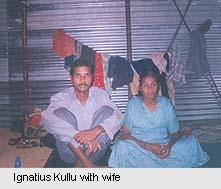
Hailing from Jharkand, people like George, Gregory and his neighbour Ignatius Kullu, knew they would not be entitled to government allotted temporary shelters in Katchal owing to their illegal status. For them, the eviction could not have come at a crueler time.
Ignatius Kullu's pregnant wife wasn't doing too well herself, the camp doctor had seen her this morning and had asked her to rest. In a few months, she will deliver her child in the camp.
His father had worked in the government's agricultural department and died along with his wife and two daughters in the tsunami. Ignatius had received a cheque of Rs 1,33,333 -- one-third of the Rs 4 lakh compensation for four deceased family members. The other two claimants were his younger brother Paulus, and his deceased sister Ignatia's children.
His brother is yet to receive the compensation. While the Andaman and Nicobar administration has disbursed around Rs 50 crore of compensation money, the Rs 1 lakh for each deceased from the Prime Minister's Relief Fund is yet to be distributed. Chief Secretary B S Negi says the names are being verified and cheques would be sent out subsequently.
Yet, for those who lost their loved ones, livelihood and a place they considered home, life couldn't be harder. Banished from an island they called home and rejected by the tribals, they are referred to as 'settlers' in Port Blair. But, in reality, they are the drifters of the cruel Asian tsunami.
With A Ganesh Nadar in Port Blair
Photographs: Archana Masih and A Ganesh Nadar; Design: Dominic Xavier
How you can help:
Support a mobile clinicFund a kid in a daycare, now!





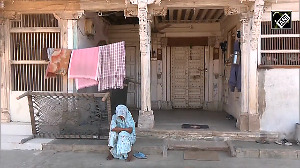
 © 2025
© 2025